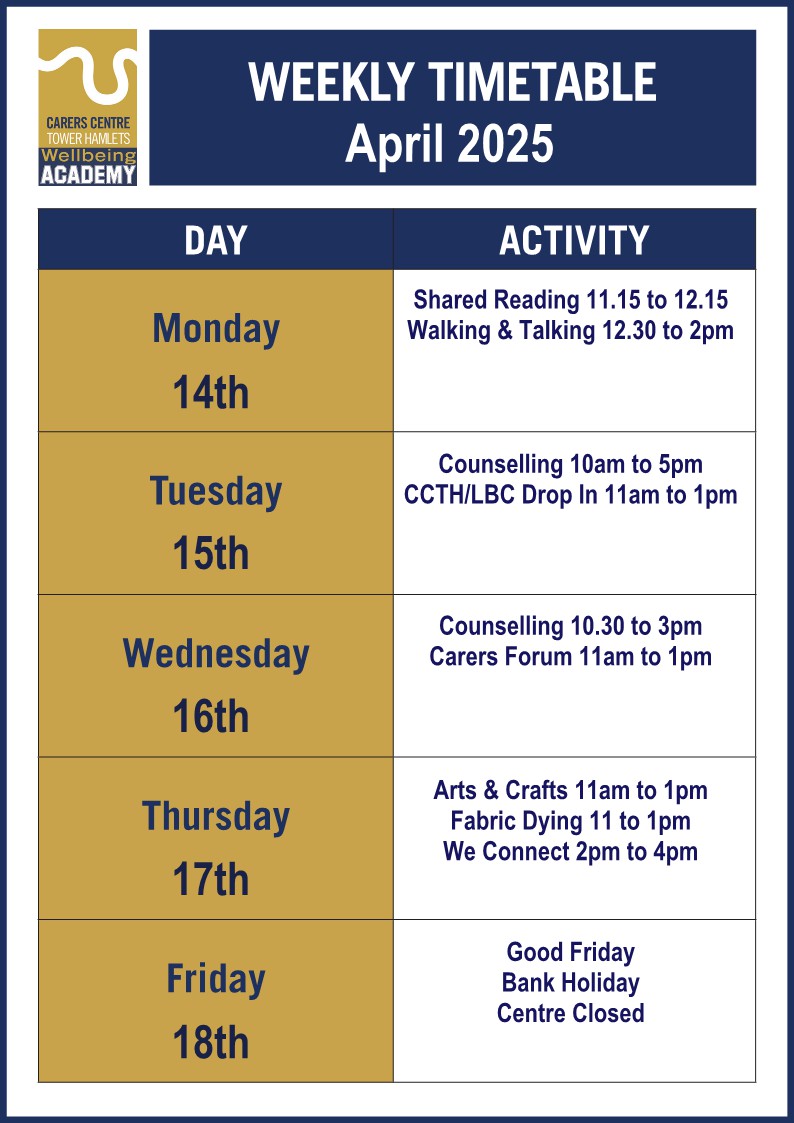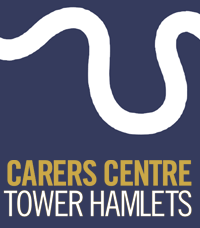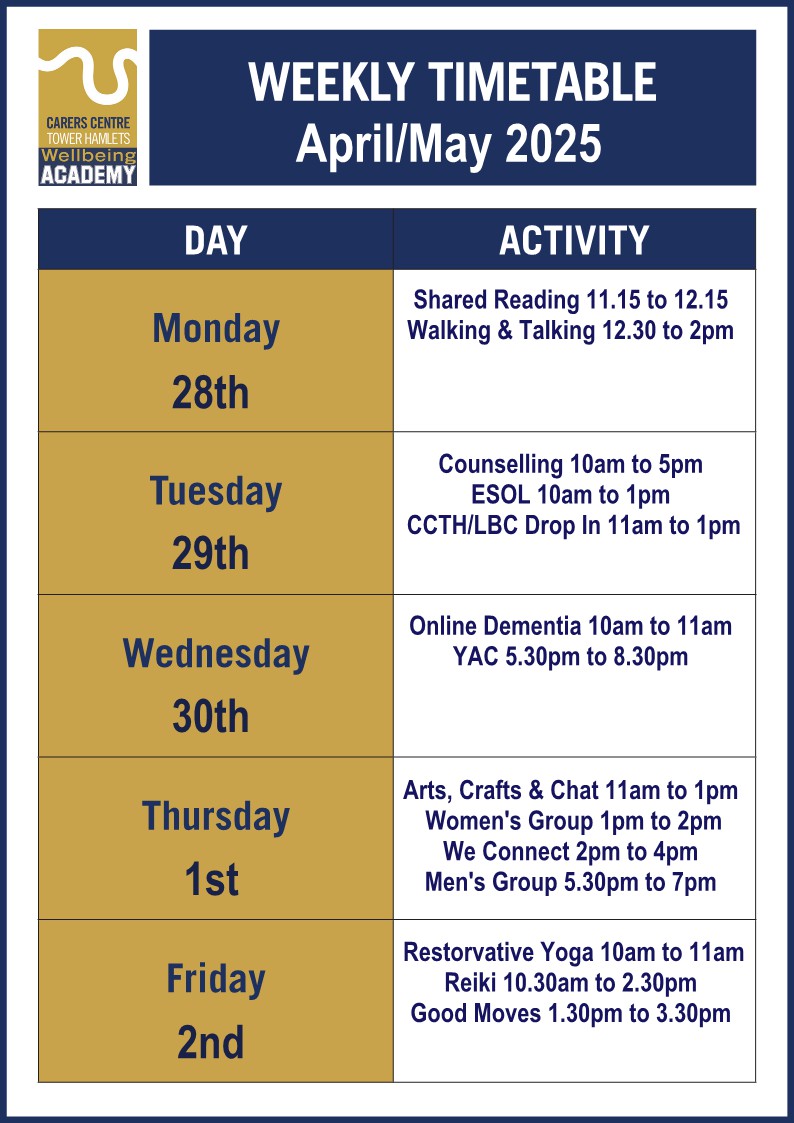Hello Everyone – Keeping well …
April 10th, 2025

Look after yourselves and if you need any help with your wellbeing activities please get in touch with the wonderful Christine wellbeing@ccth.org.uk
Don’t be shy and come and drop in to one of our activities – check out the calendar to see what is on https://ccth.org.uk/health-wellbeing/events-activities/

There are limited places and if you want to have your say then email wellbeing@ccth.org.uk to reserve your place

Tower Hamlets has lots of fun events planned over the Easter half term (Monday 14 April to Friday 25 April).
Join our parks and sports teams for eggs-citing activities during the school Easter holidays. We have multi sports, adventure play, Easter egg hunts, canoeing, biscuit decorating and more.

Stricter tests for Personal Independence Payment (PIP)
Please note there will be no immediate changes to PIP. The changes will apply to new claims and award reviews from November 2026.
For example, if you are already getting PIP now and could be affected by the changes from November 2026, the changes will only apply at your next award review. Although, there will be more face-to-face assessments, those with most severe conditions will not face reassessments and reviews under the proposed changes.
Work capability assessment to be scrapped
The work capability assessment that determines who is eligible for limited capability for work will be scrapped in 2028, under the proposals.
Instead, people applying for health-related financial support and disability benefits will only face one assessment, based on the current PIP system.
Limited Capability for Work under universal credit to be reduced for new claimants but Standard Allowance will be increased
Limited Capability for Work under Universal Credit will be frozen in cash terms for existing claimants at £97 per week from April 2025 – this means they will not be increased in line with inflation until 2029/30. However, Universal Credit’s Standard Allowance will be increased for all claimants including those who are looking for work.
The government says this will help tackle the “perverse incentives” in the system that keep people on benefits. Claimants will have also the right to try for work without losing their benefits.
Those receiving the new reduced Universal Credit Limited Capability for Work after April 2026, who have the most severe, life-long health conditions, who have no prospect of improvement and will never be able to work, will see their incomes protected through an additional premium. It also means those in that group will not be reassessed in the future.
Reduced Universal Credit’s Limited Capability for Work under 22 years old.
Those aged under 22 will no longer be able to claim the limited capability for work element top-up to Universal Credit under these proposals.
The government says any savings generated from the delay would be reinvested into work support and training opportunities for this age group.
The Government is also consulting on raising the age at which young people move from Disability Living Allowance for children to PIP from 16 to 18. The idea is that young people will have work and training “rather than a pathway to economic inactivity

It’s not too late to share your feedback in the Adult Social Care survey. This is sent to a sample of people with care and support needs who are receiving support from adult social care.
Your feedback helps us to improve services by giving us a picture on what we’re doing well and where we need to improve. If you or a family member has received this survey, please complete it by 16 May.
If you have received the survey and would like to speak to someone about it, call 0300 303 6070 or email using the link below.
email enquiry@towerhamletsconnect.org
Brick Lane Act of Remembrance 6 pm 24th April 2025 (26th Anniversary)
DATE & TIME: Thu 24 Apr 2025 6:00 PM – 6:30 PM
VENUE: 40 Brick Lane, E1 6RF
About 17-24-30 and the April Acts of Remembrance
In April 1999 the London communities of Brixton, Brick Lane and Soho were targeted by a series of nail bomb attacks over fourteen days.
- The first nail bomb was targeted towards the Black community of Brixton on Saturday the 17th April, it exploded at the side of the Iceland Store in Brixton, on Electric Avenue.
- The second nail bomb was targeted towards the Asian community of Brick Lane on Saturday the 24th April, it exploded in the boot of a car outside the Sweet and Spicy Restaurant, 40 Brick Lane.
- The third and final nail bomb was targeted towards the Gay Community of Soho on Friday 30th April, it exploded in the Admiral Duncan bar, on Old Compton Street.
In March 2009 Mark Healey set up a Facebook group called 17-24-30 to mark the 10th anniversaries of the London Nail Bomb attacks in response to an article he read that suggested the anniversaries cause pain and suffering, the communities affected by these attacks no longer care and these anniversaries should be played down.
He believed that ‘we’ (the communities affected by these attacks) have a collective duty to work together to organise these Acts of Remembrance as long as there are people who wish to gather, to stand in solidarity with those affected by these attacks as long as they need us, and to educate people about these attacks to prevent them happening again.
Mark wanted to create a space online where those affected by these attacks (survivors, their friends, colleagues and families, and members of the Black , Asian and Gay communities) could connect and stay in touch with each other – in the space of a month over 2,000 people joined the Facebook group.
Following the support shown through the Facebook group, Mark approached the people who were stepping down from organising the Soho Acts of Remembrance, offering to organise them going forward. He also reached out to the Black and Asian communities of Brixton and Brick Lane to rekindle their local Acts of Remembrance.
Since April 2010, the anti-hate crime charity 17-24-30 NationalHCAW has organised the April Acts of Remembrance; to remember those we lost, stand with those affected by these attacks and educate future generations to eliminate all forms of hate.
Each year Mark liaises with the local authorities (police and councils), key partners and local communities affected by these attacks to organise the April Acts of Remembrance.
In Brixton (17th April) and Brick Lane (24th April) we organise small gatherings at 6pm at the side of the Iceland Store, and 40 Brick Lane.
We have created a tradition of lighting three candles that represent the three people killed in Soho, and the three communities of Lambeth, Tower Hamlets and Westminster. Volunteers talk to passers-by about what happened whilst handing out hate crime leaflets to encourage hate crime reporting. We listen to people, enabling opportunities for people to express their feelings and be signposted to organisations that can provide further advice and support.
In Soho, there is a much larger Act of Remembrance on the 30th April that begins at 5pm with people gathering at the Admiral Duncan. At 6.10 pm there is a procession along Old Compton Street, around the corner to St Anne’s Gardens on Wardour Street.
In St Anne’s Gardens, people surround the triangular bench in the far left side of the gardens. There are speeches, poems, choir pieces and moments of silence as survivors, friends, family, colleagues and members of the community stand together to remember Andrea, John and Nick, David (Cinders) and Thomas.
These events are open to anyone who would like to join us – although we do ask people to register so that we can get an idea of how many people wish to attend.
Click link to book: Buy tickets – 17-24-30 National Hate Crime Awareness Week

Next Week’s Activities – check out https://ccth.org.uk/health-wellbeing/events-activities/

Next Shared Reading – Monday’s from 11.15am to 12.15pm
Shared reading is a popular group where carers are read a story and they then have the chance to debate the characters, storylines and how the story makes them feel. So, come along and have a little mental respite.
Don’t for get Sharron is rambling for better mental health as mentioned last week this years Mental Health Awareness is movement as it has been proven that exercise, walking and as we know being with others improves wellbeing so, either come for the shared reading and carry on afterwards and ramble or just join the ramble at 12.30pm and this all takes place at the Carers Centre and off you go.
Walking & Talking Group – Monday’s 12.30pm to 2pm
Why not come and have a walk in Tower Hamlets with other carers and exercise, lower your blood pressure, connect with people, have fun, and have some mental respite from your caring role. We Meet outside the centre, and we go off in a different direction each session.
Arts, Crafts & Conversation – every Thursday from 11am to 1pm
Come and learn a new craft like sewing, knitting and much much more but a great part of the experience is meeting other carers where you can have a good long natter.
Are you a Carer who finds it difficult to exercise?
Your help is needed with a research project on your relationship with exercise
Researchers at The Open University are interested in exploring the relationship that you have with leisure-time physical activity and exercise. If you are aged 18 years or over, we would like to know more about how you identify with exercise as part of your life.
The study will use an online survey to understand your demographic information (such as age and caring status) and to rate statements that relate to exercise. The survey will take approximately 10-15 minutes.
This survey, and full details of the study (OU Research Ethic Committee ref: 2025-0616-2) can be found online by clicking the link below:
https://forms.office.com/e/EJdPr4pPMM or via the QR code:


Swim well with Be Well
Be Well, the council’s leisure service, provides free swimming for women and girls aged over 16, and for all residents over 55. However, we recognise that not everyone is confident in the water, especially women.
That’s why we’re offering free swim clinics for women during female-only swim sessions. These are not structured swimming lessons.
See more >

What is a hate crime?
Hate crime is any criminal offence where anyone believes the victim has been targeted because of their:
- disability
- race or ethnic identity
- religion/belief
- gender or gender identity
- sexual orientation
- age
- immigration status or nationality
- or any other actual or perceived difference.
Hate crime behaviours can include
- physical attacks – pushing and shoving to serious assaults
- verbal abuse – using derogatory or insulting words
- threatening behaviour, bullying and intimidation
- damage to property – including offensive graffiti
- harassment
- malicious communications – threatening or offensive mail, texts or emails
- damage to property and violence
- hate can also be directed at whole communities – for example, vandalism of places of worship, or offensive graffiti in public places.
Hate incidents
Are incidents that do not constitute a criminal offence but cause alarm, distress or harassment where anyone believes the victim has been targeted because of their race/ethnicity, religion/belief, gender/gender identity, disability, age, sexual orientation or any other actual or perceived difference.
For more information and how to report hate crimes visit www.towerhamlets.gov.uk/hatecrime
Our Hate Crime Manual with a Directory of support services is available via this link Tower Hamlets Hate Crime Manual.
Remember an attack on one section of our community is an attack on us all.
Domestic Abuse Number
Refuge: 24 hours, 7 days a week – Tel: 0808 2000 247

Food Banks Information
What you need to know
With the cost of living crisis affecting communities nationwide, the London Borough of Tower Hamlets have shared information on accessing your local FOOD Stores and tips on managing your food bills.
Tower Hamlets FOOD Stores
A number of FOOD stores have been set up across the borough, supporting those who are finding it difficult to afford enough food for themselves or their families.
At these FOOD stores, you are able to pick up food valued at £25-£35 in exchange for a £3.50 membership fee. At the same time, support is provided in other areas that you might need help with. This includes help with issues around
- housing
- benefits access
- employment and more.
To find out more or to become a member email thefoodstore@towerhamlets.gov.uk with your name, address, postcode, date of birth and contact number.
Foodbanks
There are a number of food aid organisations available to help you in Tower Hamlets if you are struggling to get food for yourself or your family. Scroll down to see where your closest branch is located. Different food aid services will offer different support.
Types
- Open Access – A food bank that anyone can go to for food.
- Limited Access/referral only – A Food bank that needs someone to refer you into the service. Please contact the organisation for more details.
- School food provision – A food bank or food aid service that specifically works with students and parents who attend the school.
- Hot meals service/Hostel – Provides hot meals or pre-made goods to residents.
Underwood Road Foodbank – (Open Access)
Opening times: Thursday and Friday, 9am – 3pm
St Anne’s Catholic Church, E1 5AW
Contact: 020 7247 7833 or email underwoodroad@rcdow.org.uk from Tuesday to Friday (9am – 3pm)
Ensign Youth Club – (Open Access)
Opening times: Friday 10am – 1pm
Wellclose Sq, E1 8HY
Contact: info@ensign.org.uk
Hague Primary School
Opening times: Monday – Friday 8.40am – 3.40pm
Hague primary school, E2 0BP and E1 5RE
For more information please ask at the school office.
Stewart Headlam Primary School
Opening times: Monday – Friday 8.40am – 3.40pm
Tapp St, London, E1 5RE
For more information please ask at the school office.
Wellington Primary School – Food bank (limited access/by referral only)
School food provision (Pupils and families only)
Opening times: Tuesday 2 – 3pm
Wellington Way, Bow, E3 4NE
Contact: admin@wellington.towerhamlets.sch.uk
St Elizabeth Pop Up Kitchen – School food provision (pupils and families only)
Opening times: 3.40 – 5pm
St Elizabeth Primary School, entrance on Waterloo Gardens, E2 9JY
For more information please visit St Elizabeth School website / Caritas Twitter page.
Bygrove School – School food provision (pupils and families only)
Opening times: Monday – Friday (Term Time Only)
Bygrove street, E14 6DN
For more information please visit the Bygrove School website.
Langdon Park School – School food provision (pupils and families only)
Opening times: Monday – Friday 8am – 4pm
Bright Street, London, E14 0RZ
For more information please ask at the school office.
Dorset Community Food Hub – (Open Access – Hot meals service)
Opening times: Thursday
Ground floor, former Dorset library, E2 8QX
For more information please visit the Dorset Community website.
Olga Primary School Foodbank – School food provision (pupils and families only)
Opening times: Friday 3.20 – 3.45pm
Olga Primary School, E3 5DN
Contact: 020 8981 7127
Edward Gibbons House – (Hostel)
Opening times: 24 hours
1 Parmiter St, E2 9NG
For more information please visit Providence Row website.
Globe Primary School – (Open Access)
Opening times: Friday 12 – 3.15pm
Globe Primary School, E2 0JH
For more information please visit Globe Primary School website.
Food for Aldgate – (Limited access/by referral only)
Opening times: Friday 1 – 3pm
Tonybee Hall, 28 Commercial Street, London, E1 6AB
Contact: Paul.wilson@eastendhomes.net or Twitter @FoodForAldgate.
Womens Inclusive Team – (Limited access/by referral only)
Opening times: Appointment provided after referral
Mayfield House 202 Cambridge Heath Road, E2 9LJ
Contact: 07415 372 664 or email shakilaa@wit.org.uk.
William Davis Food Bank – School food provision (pupils and families only)
Opening times: Friday 2 – 3pm
William Davis School, E2 6ET
Contact: 020 7739 1511
Bow Food Bank – (Open Access)
Opening times: Monday 8am – 12.30pm
Bromley by Bow Centre, St Leonard’s Street, E3 3BT
For more information please visit the Bow Food Bank website.
Bethnal Green Foodbank – (Open Access)
Opening times: Wednesday 2 – 7pm
Raines Foundations School, Approach road, E2 9LY
For more information please visit Bow Food Bank website.
Bow Muslim Cultural Centre – (Open Access)
Opening times: Friday 11am – 3pm
246 Bow Road London, E3 3AP
Contact: info@bowcentralmosque.co.uk
SACC Food Bank – (Limited access/by referral only)
Opening times: Thursday and Friday 10am – 3pm
St Anne’s Catholic Church, E1 5AW
Contact: braziliancp@rcdow.org.uk or 020 7247 7833.
Referrals can be discussed by email or contact number.
A carers guide to home fire safety
A new video resource has been launched on the London Fire Brigade website to help carers learn how to keep people that receive care safe from fire.
Sadly, around one third of those here who die or are severely injured by fire are in receipt of some form of care or support. If you are a formal (domiciliary care worker, support worker or clinician) or informal carer (family member, friend or neighbour) and are caring for someone in their own home, this new resource will help you identify fire risks and show you what you can do to reduce them. There is also more information available on the website around fire safety and prevention.
Watch the video >

WALKING ALONE? REMEMBER THESE 10 TIPS
1) Plan Your Route
Make sure you plan your route ahead of time. If you are walking in an area you are not familiar with, this can help keep you from getting lost. You will be able to walk with confidence. If you do get lost, don’t wander aimlessly, find a gas station, supermarket, or fast-food restaurant where you can ask for directions.
2) Make Sure Someone Else Knows Your Plans
Don’t go out when it is dark without telling someone, even if you are just taking the dogs out for a walk around your neighbourhood or walking home from a friend’s house nearby. It may seem paranoid, but in fact, knowing someone knows where you are can be reassuring and help you feel safe. If you fall and hurt yourself or run into trouble, and someone knows where you are, they can send help if you don’t arrive at your destination on time.
3) Always Carry Your Phone with You
Always carry your phone, but not for music or to make social calls as your walk. Your phone can be a lifeline if you see something suspicious or worse if something happens to you. Download a safety app on your phone, so you’ll be able to discreetly alert the authorities if you feel threatened or see something suspicious.
4) Avoid Suspicious People and Areas
Areas that are dark, deserted, or out-of-the-way, such as an alley or a parking lot, can be riskier than a well-lit area full of people. Stick to busy, lighted paths, to minimize the risks. Also, walk mainly in familiar places where you are known. That way, if you feel like a suspicious person is following you, you can always duck into a store you know or knock on a neighbour’s door. Avoid empty streets and pathways with thick shrubbery.
5) Keep Your Hands Free
Except for a flashlight and one of the items discussed below, keep your hands free. If you are carrying anything, put it all in one bag or backpack. This will make it easier for you to react if you notice someone following you. In a dangerous situation, carrying too many bags can keep you from moving as quickly as you can if your hands are free or if you only have one bag.
6) Carry a Non-Violent Deterrent
In addition to a flashlight, A whistle will help you alert others and call them to aid you if something is wrong. The loud noise may put off attackers, and they’ll move on to find someone else. Mace or pepper spray can give you enough time to evade a potential attacker, and in a pinch, a flashlight can be used as a weapon. Make sure you know how to use the mace or pepper spray to get its full effect.
7) Wear Reflective Clothing to Prevent Accidents
When it comes to personal safety, it’s not just about suspicious people. Areas with low visibility can be prone to accidents. Reflective clothing allows bikers and cars to see you as you walk along. A flashlight or headlight can also help drivers see you if there are dark stretches of road on your route.
8) Take a Self-Defence Class
When fighting off something as an assault, the element of surprise can work in your favour. If you regularly walk alone, take a self-defence class. You don’t have to become a black belt. In fact, it’s probably better to learn something like Krav Maga, which has been popular for self-defence. The idea is to disable your attacker enough for you to get to safety, and a class focused on self-defence will help give you those survival skills.
9) Remove Any Distractions
Keep your phone in your hand in case you need to hit the panic button on your safety app, but don’t let it distract you. When walking alone at night for exercise, music can be motivating and energizing but also distracting. You may not hear someone driving or walking up behind you. Avoid wearing headphones or talking on your phone as you walk.
10) Trust Your Gut
When walking alone at night, trust your gut. If you feel like an area or situation may be dangerous, don’t wait around to find out. Stop and scan your surroundings if you think someone is following you. If you are being followed, walk as quickly as you can to a well-lit public place. You can wait until you feel safe, or call a friend, a taxi, or an Uber to help you get safely get home at night.
Following these personal safety tips will help keep you stay safe when walking alone. Always be aware of where you are and alert to suspicious activity.





